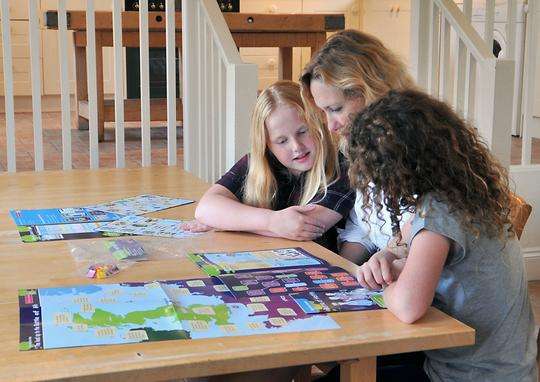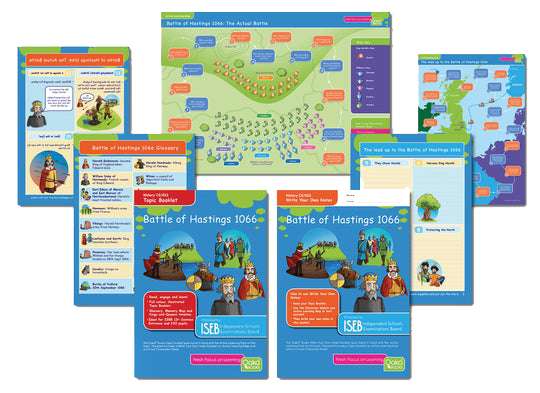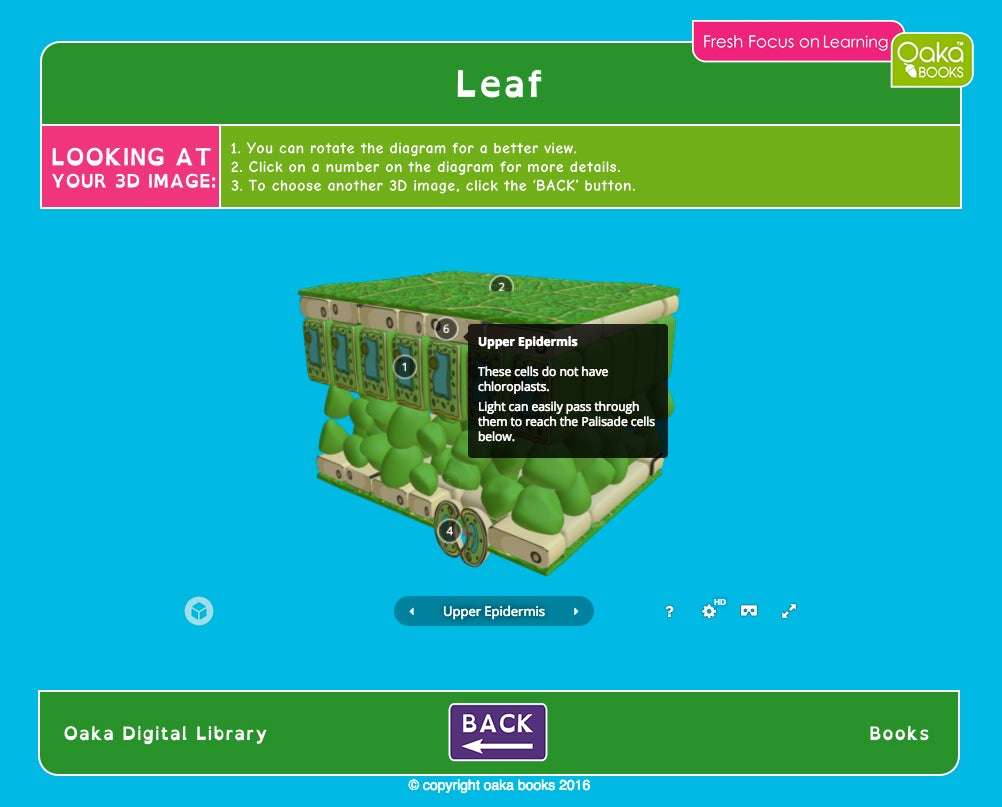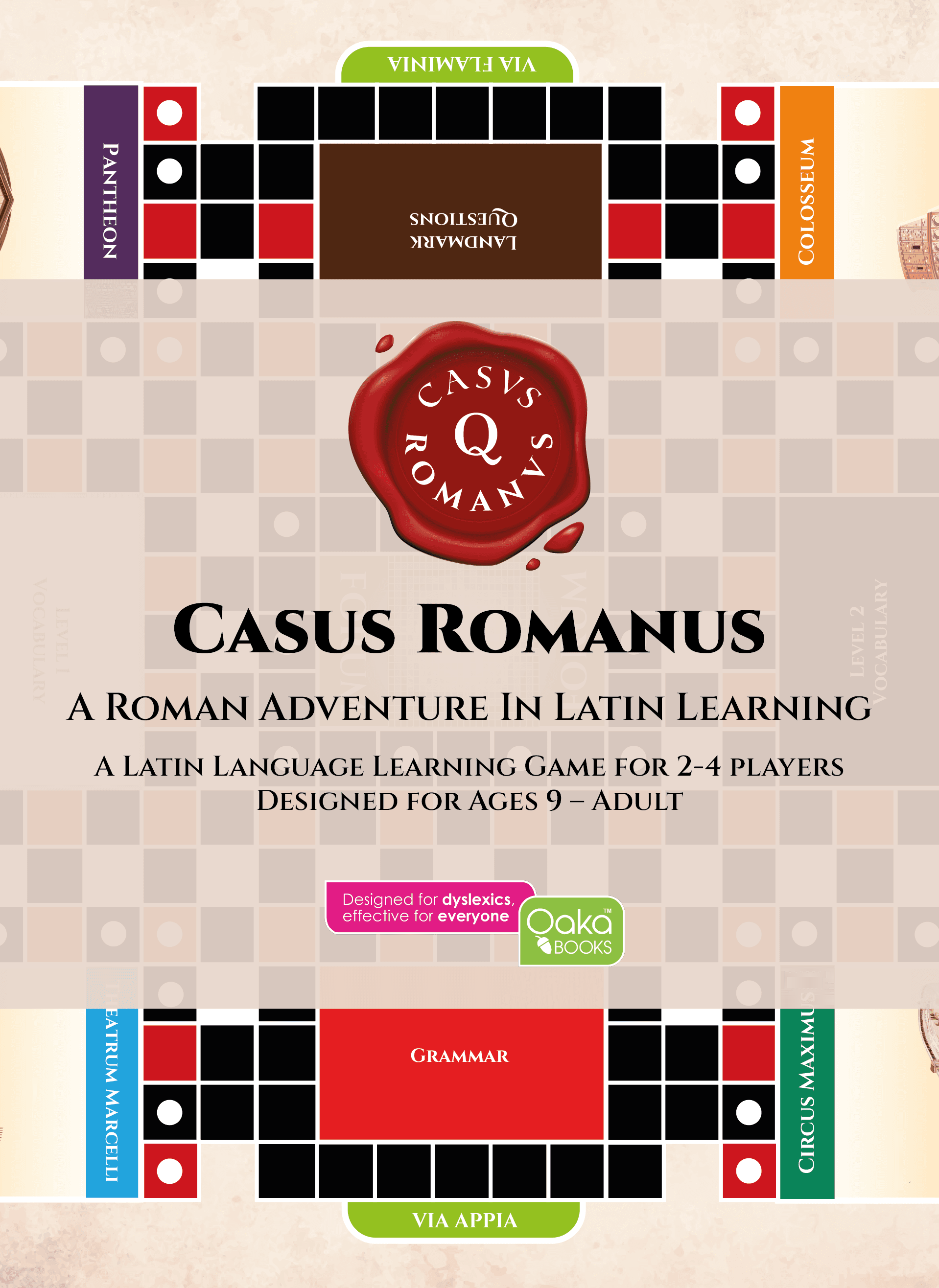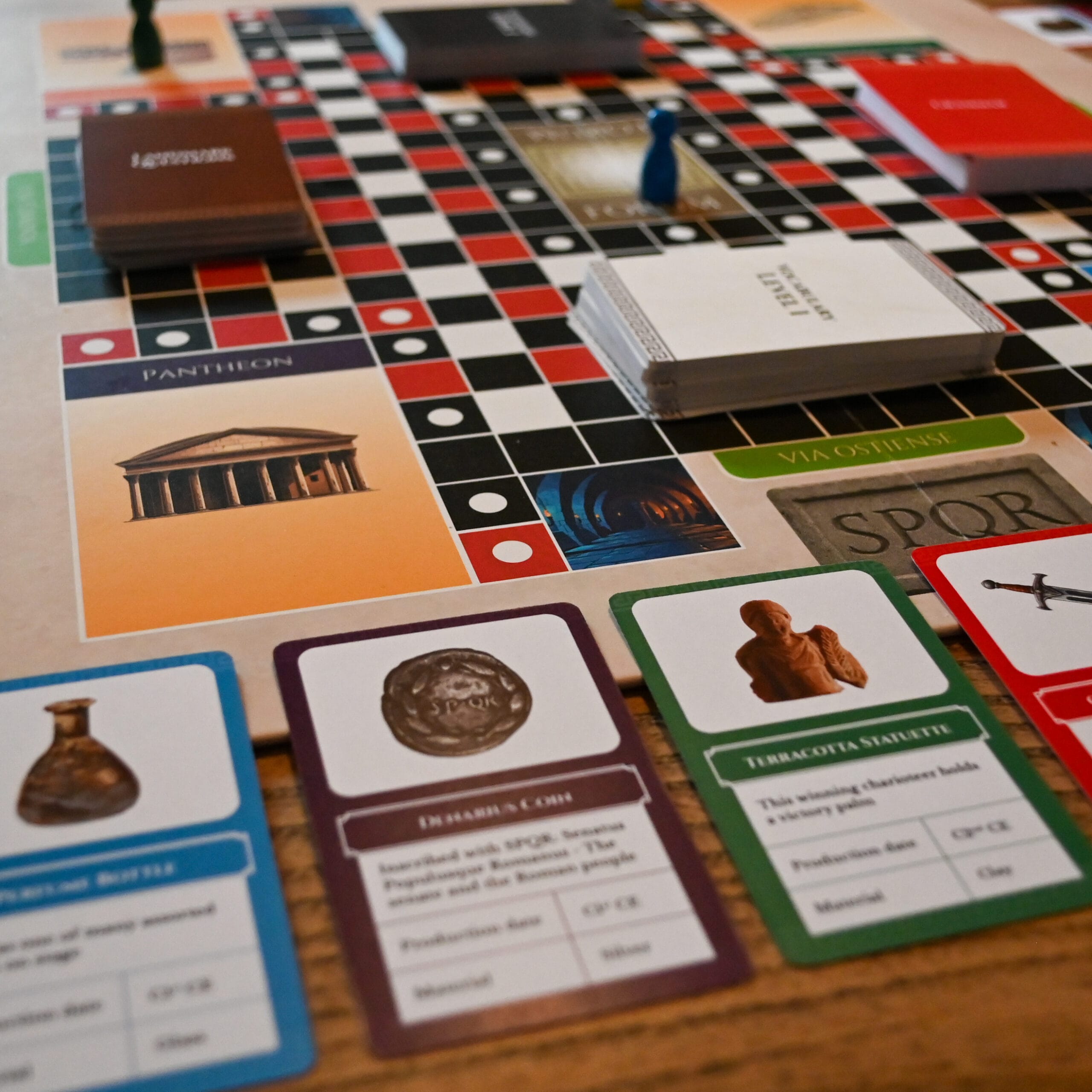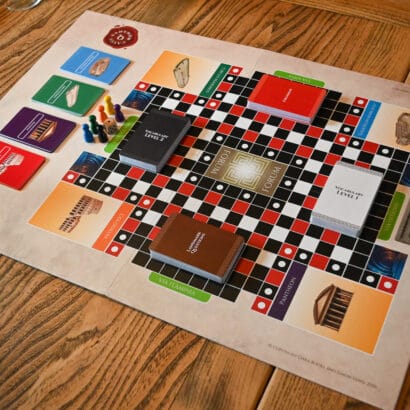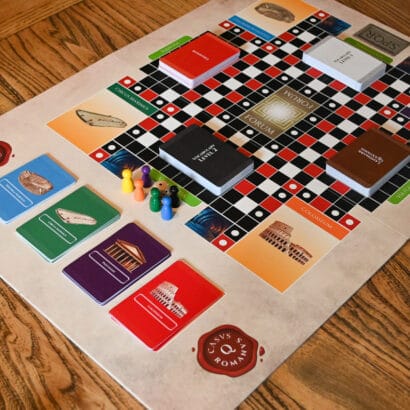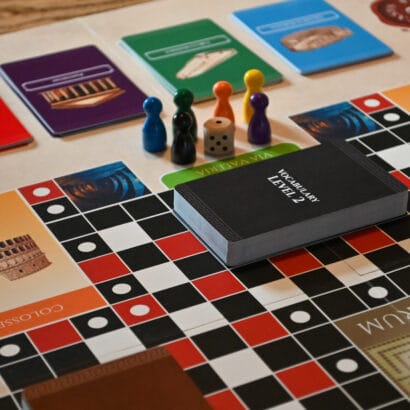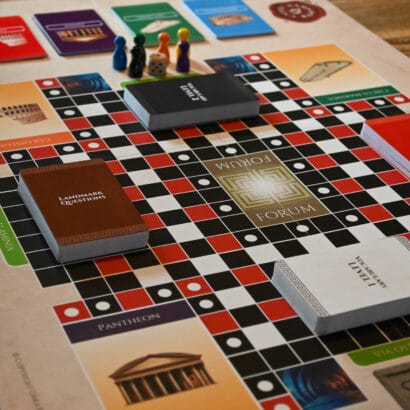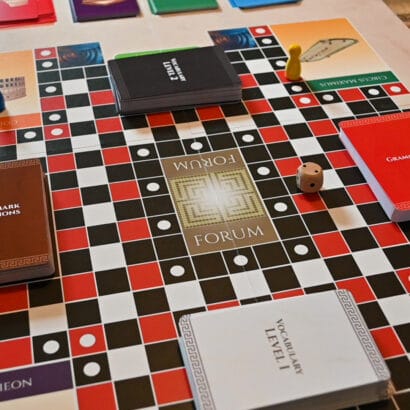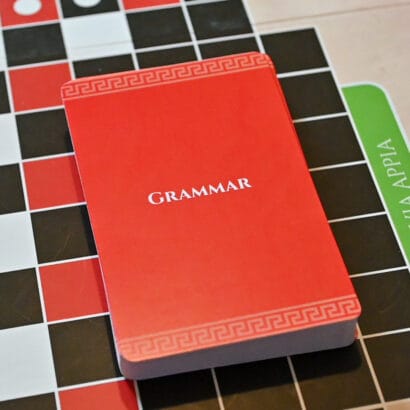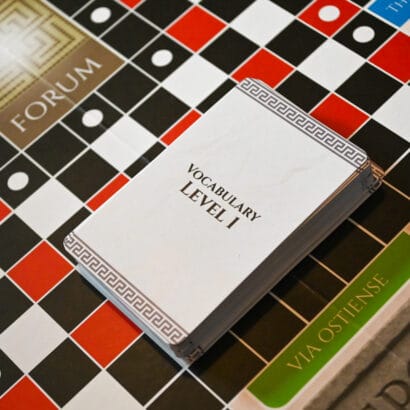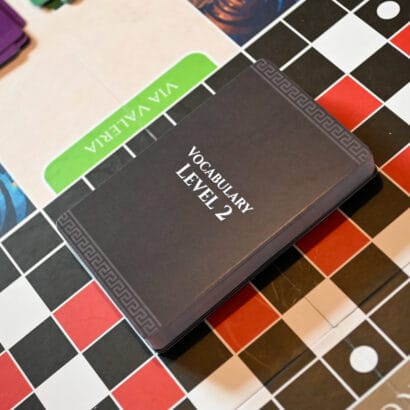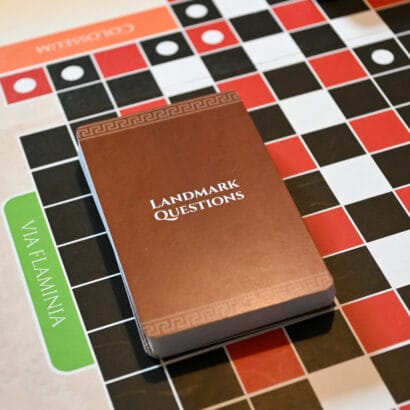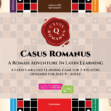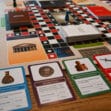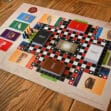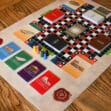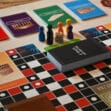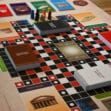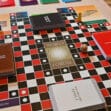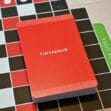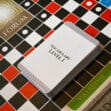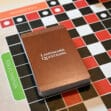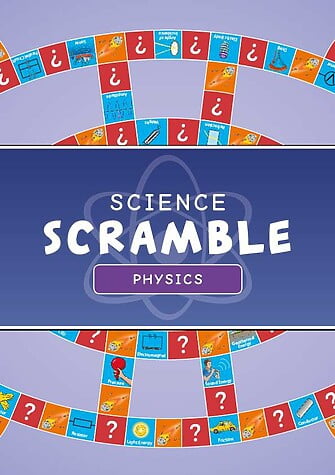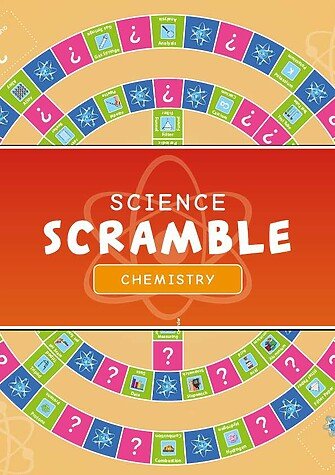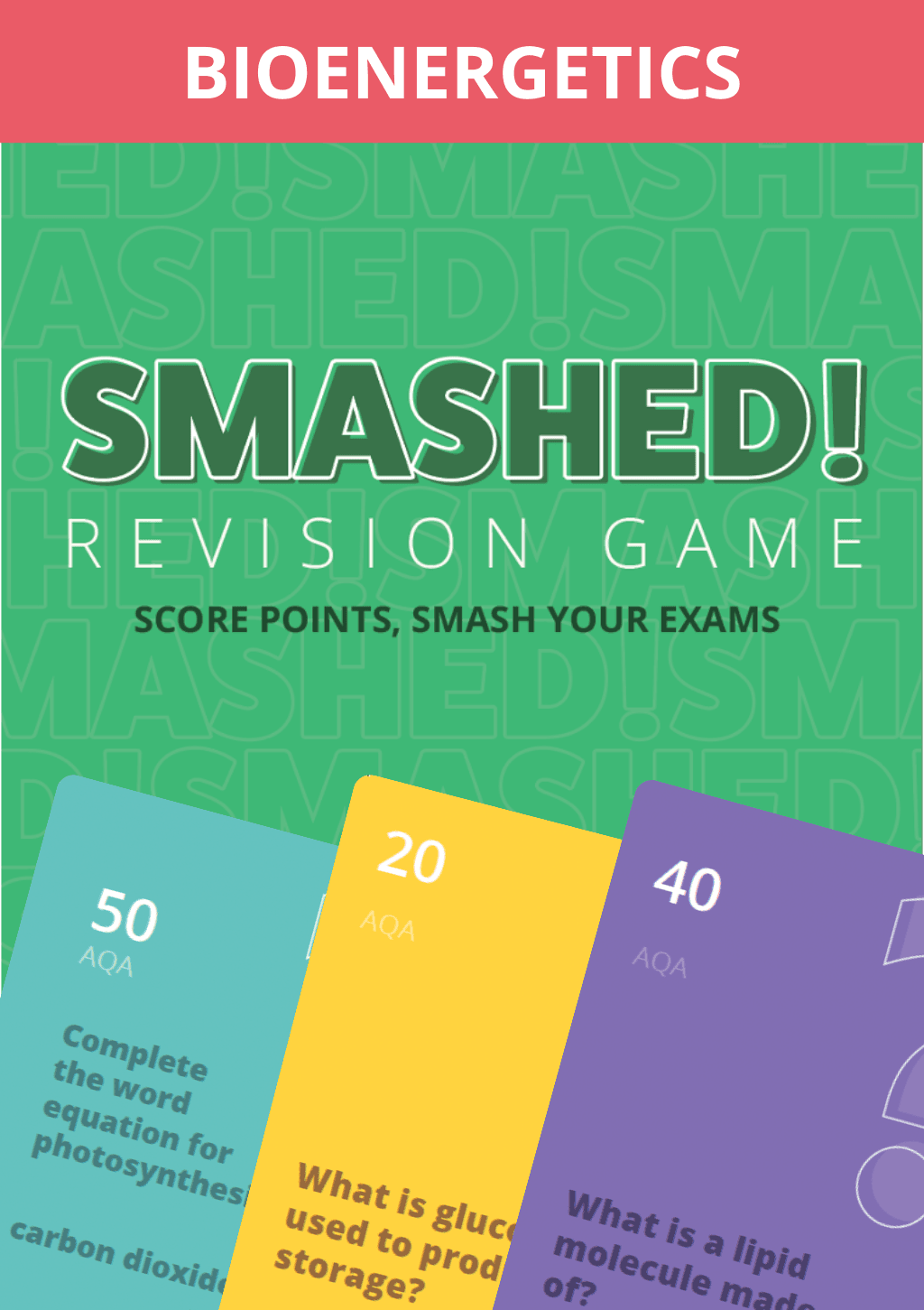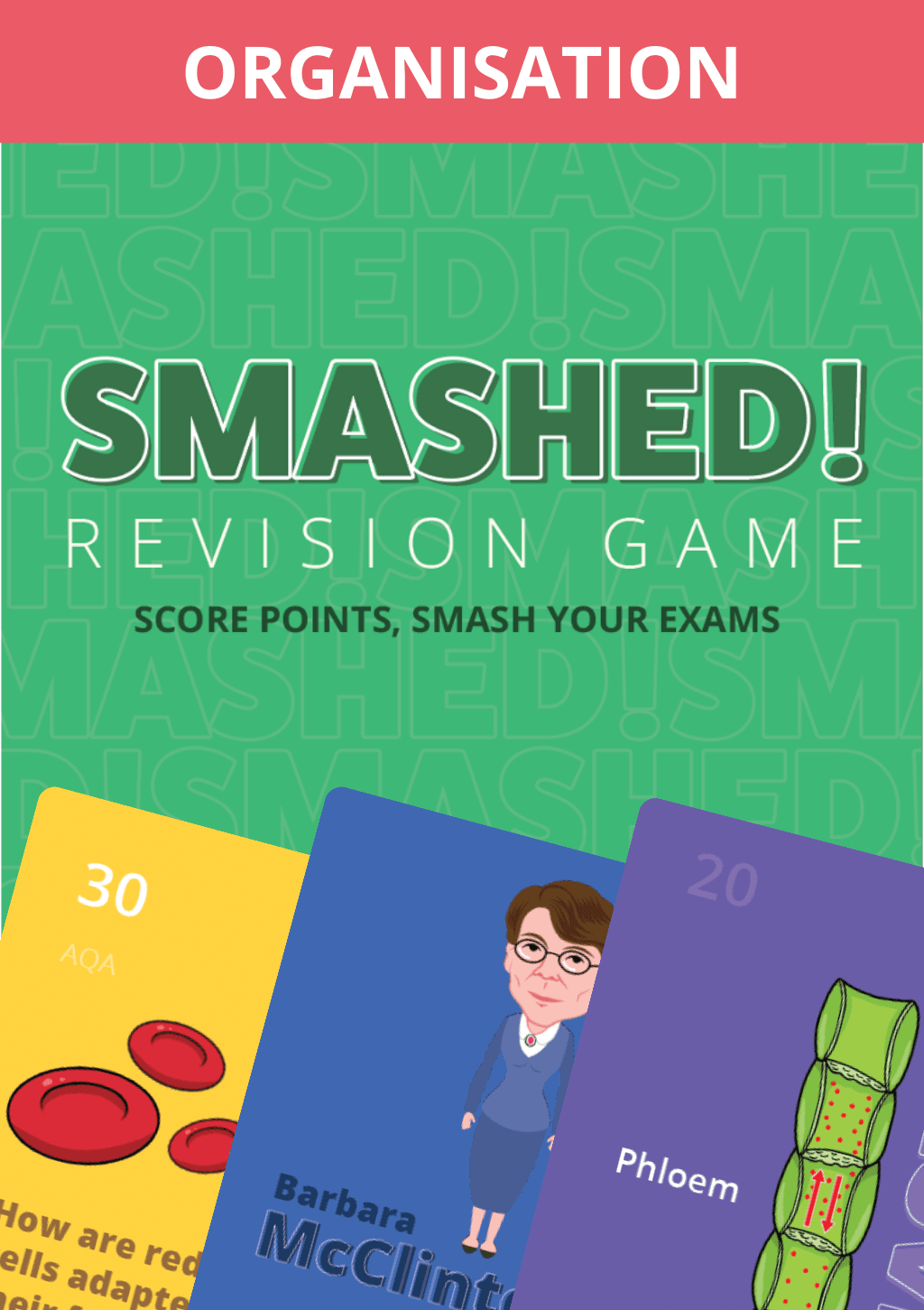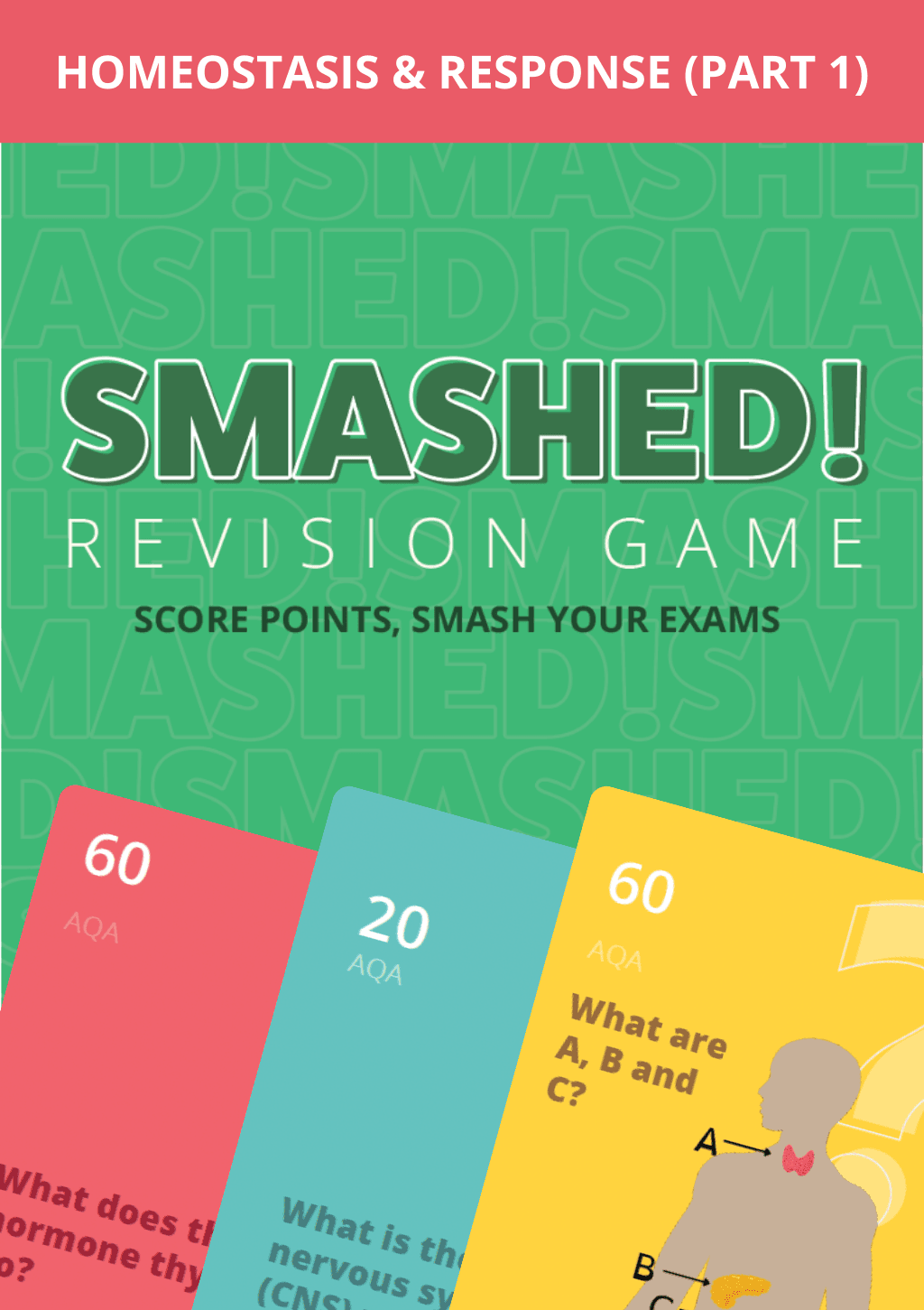Embark on an unforgettable journey through Ancient Rome with Casus Romanus! 🎲
This immersive board game is meticulously designed to make Latin learning both enjoyable and effective for all students, especially for visual learners, dyslexic pupils, and children with special educational needs (SEN).
Why Choose Casus Romanus?
-
Engaging Learning Experience: Players become Roman citizens exploring iconic landmarks like the Colosseum, Pantheon, Circus Maximus, and Theatre Marcellus. This adventure transforms Latin vocabulary and grammar into interactive challenges, making learning both dynamic and memorable.
-
Tailored for SEN Students: Recognising the unique learning styles of SEN pupils, Casus Romanus incorporates multisensory techniques, ensuring that every child can grasp and retain Latin concepts effectively.
-
Boosts Confidence and Enthusiasm: By integrating play with education, this game fosters a positive learning environment, helping children build self-assurance in their language skills.
What’s Inside the Box?
-
A beautifully illustrated 17×19 tile playing board depicting Ancient Rome.
-
Four Roman citizen playing pieces in vibrant colours.
-
A six-sided die.
-
160 question cards covering Easy and Hard Latin Vocabulary, Latin Grammar, Roman/Greek Myths, and Roman Civilisation.
-
40 Roman relic reward cards as souvenirs from each landmark.
How Does It Work?
Starting from the central Forum, players navigate the streets of Rome, answering questions to progress and collect souvenirs. The goal is to visit all four landmarks, gather unique relics, and return safely to the Forum, all while enhancing Latin language skills.
Invest in Your Child’s Educational Journey
Priced at £29.98, Casus Romanus offers a valuable blend of education and entertainment. It’s more than just a game; it’s a tool that supports your child’s academic growth and love for learning.
Order Now
Don’t miss out on this opportunity to enrich your child’s educational experience. Order Casus Romanus today and watch them embark on a captivating adventure through history and language!
How Casus Romanus Was Created
Casus Romanus (Roman Adventure) is a Latin language learning Game for 2-6 players, aged 11 – Adult, created by Simon Lewis & Jeanette Heugh and published by Oaka Books in June, 2025.
So, who are the creators…and how did Casus Romanus come into being?
Casus Romanus is a fun way of reinforcing an understanding of the Latin language, its vocabulary and grammar, together with learning about the Roman civilisation, its religion and legends based on ancient Roman and Greek ancestry.
The main aim was to create a board game that was both educational and engaging to play. Casus Romanus embraces kinaesthetic learning and oracy to bring Latin to life and to provide an original approach to learning classical studies.
Simon Lewis is a Geographer by background and a former headmaster; Jeanette Heugh is a Cambridge graduate and a highly experienced former head of Classics and dedicated Latin teacher. Teaming up to create Casus Romanus has proved a winning formula!
In 2019, supported by Oaka Books and its co-founder, Bambi Gardiner, Simon had created ‘Geogo!’, an Ordnance Survey based, map-reading board game that in 2020 was awarded a Silver Award by the Geographical Association for its design and contribution to geographical learning. Buoyed by this success, Simon wanted to develop more educational games and set his sights on Latin. ‘I always admired the Roman civilisation when studying Latin at school’ says Simon, who felt inspired by the sheer ingenuity and sophistication of all things Roman. ‘The Romans were certainly ahead of their time’ says Simon ‘And had all the complexity of modern society, a social hierarchy, together with awesome military and engineering prowess’.
Although not a Latin scholar, Simon wanted to give back something to the subject in order to inject some new life into its teaching, particularly as there has been a reduction in GCSE and A Level entries over recent years. Sadly, Latin teaching in UK schools has been declining, particularly in state schools, with funding cuts significantly impacting access to the subject. While Latin is still relatively common in private schools, the number of state schools offering it has dwindled, and the recent termination of the Latin Excellence Programme (LEP) has exacerbated the issue. According to the Britishcouncil.org, a 2020 survey showed that only 2.7% of state schools offered Latin, compared to 49% of private schools
Exam entries for ancient languages (including Latin) have also been declining, with a 9% drop between 2020 and 2024.
The LEP, which aimed to expand Latin access in state schools, was recently terminated, causing concern about the future of Latin in these schools.
Simon’s idea for a Latin-based game drew inspiration from the Roman mosaics, so ubiquitous in the floors of Roman buildings. Adapting a red black and white tile design, Simon felt that the individual squares could be the playing spaces for his game, the colour coding dividing naturally into Easy vocabulary (white), Hard vocabulary (black) and Grammar (red). Moving around the board was akin to crossing a mosaic floor and would thus add to the immersive experience of playing the game.
He then thought about the landmarks of Ancient Rome, starting with the Forum (the meeting place in all Roman cities), that could be the centrally located starting and finishing space for the playing pieces. Choosing four iconic landmarks that represented key cultural focus points for citizens and visitors to Rome…the Colosseum, the Pantheon, the Circus Maximus and the Theatre of Marcellus, Simon located them on the board at each of the corners and in roughly their geographic locations that they are found to this day. These were then bordered by the names of four famous Roman roads that emanated north, south, east and west from the city, Via Flamina (running north) , Ostiense (running west), Valeria (running east) and the most famous Appia (the first great Roman road, that ran south, with its construction beginning in 312 BCE). These roads were again a nod to Roman civilisation and very much part of the playing experience.
Starting at the Roman Forum, the aim for players is to visit all four of the landmarks and to acquire a souvenir from each by correctly answering questions on either Roman Civilisation or Greek and Roman Mythology, so beloved by the Romans. Only when a player has acquired a souvenir from all four landmarks can they make their way back to the Forum…and win the game!
In order to add interest and further learning to the game, Simon carefully researched each landmark to create ten themed Roman artefacts based on the primary use of the landmark building in ancient times. Thus, the Coliseum artefact cards are all to do with gladiatorial combat; the artefacts for the Theatre of Marcellus embrace Roman theatre and music; the Circus Maximus, chariot racing and the Pantheon, law and governance.
In addition, and in the course of extra research, Simon visited all four landmarks, together with the Forum on a special trip to Rome in 2024.
The landmarks of Rome as they appear today and in their approximate positions relative to the Forum.
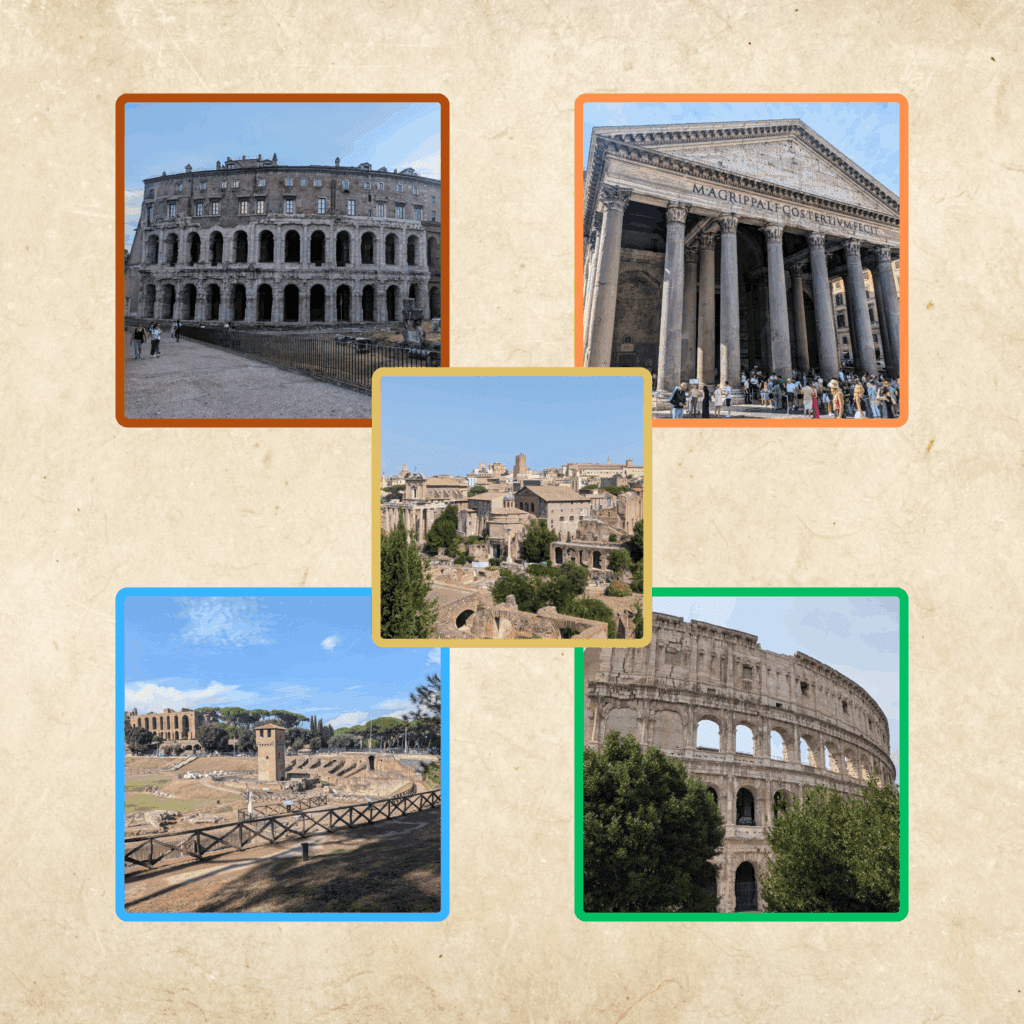
On the board, to restrict entry and exit points to the landmarks and the Forum, column squares were designated.
Finally, the famous Roman Catacombs were added after the first testing of the game, in order to add both an element of jeopardy and a short-cut advantage for players!
Devising the Questions Jeanette Heugh
When Simon first told me his idea for Casus Romanus, I was impressed and keen to be involved. My love of Latin began at the age of 12 when my class was introduced to stories about Caecilius and his family who lived in Pompeii. Unfortunately (or possibly fortunately), I didn’t make the best start. The first time I was called upon to translate a Latin sentence in class, I got it wrong. My teacher then chose someone else who provided the correct translation. That moment was a turning point for me: I realised that, in order to achieve success, more careful thinking and greater attention to detail were essential. I sharpened up and went on to score 99% in the summer exam. But it wasn’t just success in Latin that resulted from my new approach. The thinking skills I developed through Latin were of benefit across the curriculum and greatly aided my academic achievement in all aspects of my education.
Firmly convinced of the value of Latin, it was a natural progression into teaching it and I have been fortunate enough to be Head of Classics in three different schools. This has of course included the fascinating study of Roman civilisation and delving into the fantastic world of classical mythology. School trips to Pompeii and Herculaneum provided an amazing insight into an ancient way of life. Always a highlight was seeing the actual villa where Caecilius lived until Mount Vesuvius erupted in 79 CE. My first visit to Rome was equally memorable. There was, it seemed, a feast of culture round every corner. Hence Rome is the perfect setting for Casus Romanus and the linguistic and cultural treasures it imparts.
I have always relished meeting new Latin vocabulary and discovering links with English and French has been a particular joy. When creating the vocabulary questions, I used material from Common Entrance and GCSE as well as Latin phrases we use today. The grammar questions are varied and help to reinforce grammatical terminology as well as testing the understanding of rules. They are multiple choice which allows for careful consideration of the options, as well as guess work if all else fails! In the questions on Roman civilisations, I aimed to cover different features of Roman life and history, including their venture into Britain. The mythology questions are drawn from the Greek myths that the Romans loved and adopted and which still make fabulous reading today.
I was surprised to hear that the University of Oxford intends to abolish its undergraduate Classics degree. However, as an alumna, I’m delighted that the University of Cambridge is not following this retrograde step.
After many years of teaching and seeing students reap the benefits of learning Latin, I believe most strongly that it remains relevant and should retain a position of importance in our education. Casus Romanus can hopefully play a small but enjoyable part in encouraging this!

